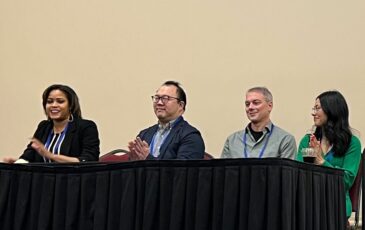
Researchers gathered last month at the biennial Society for Research in Child Development conference in Salt Lake City to discuss the impacts of various technologies and media on children’s learning and development. The Joan Ganz Cooney Center was honored to organize a conversational roundtable inspired by the Responsible Innovation in Technology for Children (RITEC) initiative, founded by the LEGO Group and UNICEF and supported by the LEGO Foundation.
On March 24, 2023, Cooney Center Senior Director of Research Medha Tare moderated a panel of experts to discuss Designing for Digital Well-being: Frameworks for Optimizing Positive Media Experiences for Children and Families. The panelists discussed how developmental science can help identify opportunities and pathways to design equitable, accessible, and enriching digital experiences. The conversation ranged from defining well-being in a digital age to co-design practices with children to questioning who else needs to be at the table to address well-being for all children.
Amanda LaTasha Armstrong, a research fellow at New America’s Education Policy Program, shared that she takes a critical perspective when considering well-being in digital spaces because it’s difficult to know what kind of experiences and potential harms an individual may have faced. Her work has addressed the need to minimize bias and examine how media influences the understanding of self and others through its depictions of different identity groups. She also shared how her youth programs around game design help to develop students’ media literacy, social-emotional growth, as well as design and technology skills.
Bruce Homer, professor of educational psychology at The Graduate Center, CUNY, commented on the factors in digital activities that can contribute to children’s well-being, which include meeting children’s needs for competence, connection, and autonomy. Children need to be appropriately challenged in game spaces, according to the developmental zone of proximal development theory, as well as have the opportunity to connect with friends and exercise control in ways that they may not have in their everyday lives. Jason Yip, assistant professor at the Information School and adjunct assistant professor in Human Centered Design & Engineering at University of Washington and director of KidsTeam UW, agreed that high-quality digital experiences must offer the right level of challenge for different players, including intergenerational, so that parents and kids can play together, in games such as Animal Crossing.
Speakers also focused on creating inclusive design processes by building relationships with children, so that when co-designing technology with them, their perspectives are truly shared and understood. Remi Torres, who directs content research at Sesame Workshop, described how every game or other media produced has an evidence-based curriculum behind it. All of this content is further tested in formative research with children, ensuring that the Workshop produces high-quality products for families.
Jason reiterated that we “can’t stop the tsunami” of new technology that children and adults will encounter, so we must be proactive in preparing ourselves and our children to be well in digital spaces. In terms of methods, smaller or more qualitative studies must be agile enough to keep up with the ever-changing technology landscape.

